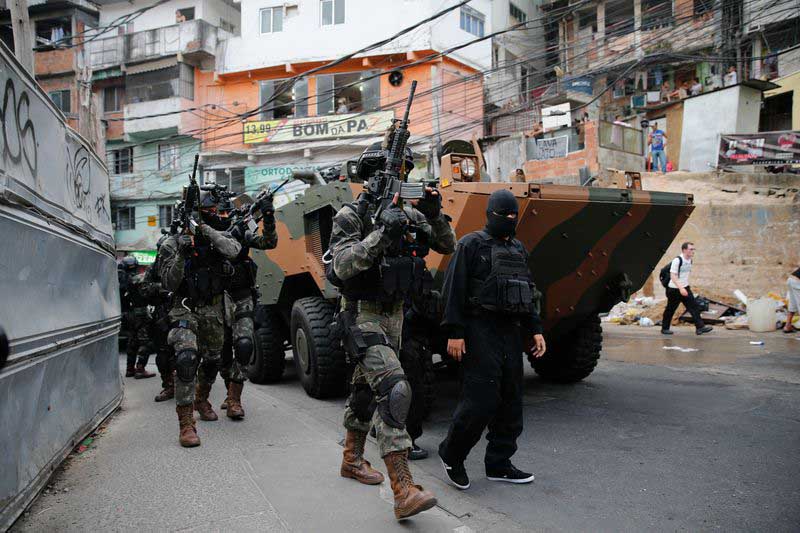In one year since the ADPF Favelas Case, number of deaths and shootings falls in Rio de Janeiro, but pattern of police violence has not changed, says report
According to the Crossfire Institute and GENI (Study Group of New Illegalisms) of UFF (Fluminense Federal University), the state government is flouting ADPF Case 635 and defying the Supreme Court

In one year since the Supreme Court ruling on ADPF Case 635, known as the ADPF Favelas Case, shootings have fallen by 25% compared to the year before the measure took effect. The number of people who have been shot has fallen even more: by 28%. On the one hand, the ruling by the Supreme Court has saved lives. On the other, the number of shootings with victims – which occur mostly in cases involving the police – remained stable, indicating that the police did not change their conduct, only that they took less action. This is the finding of a report prepared by the Crossfire Institute and GENI (Study Group of New Illegalisms) of UFF (Fluminense Federal University).
A quarter of the 4,588 shootings identified by the Crossfire Institute since the start of the restrictions established by the ADPF Favelas Case resulted in people being shot. However, when we consider only the shootings involving police officers (1,266), the proportion more than doubled: 62% of them resulted in deaths or injuries. “Shootings involving police officers are more likely to end up with people being shot than actually making people safer. In the year preceding the ADPF case, the numbers were practically the same, showing that the restrictions did not alter the behavior of the police,” said Maria Isabel Couto, program director at Conectas.
And the further away from the state capital, the greater the risk. In the Baixada Fluminense region, even after the ADPF case, 77% of the shootings involving the police resulted in victims – which demonstrates that the ADPF case had no effect outside the capital.
These data show that the massacre in Jacarezinho, which occurred a month ago this Sunday, June 13, is no exception. Despite a reduction of nearly 30%, in the first year of the restrictions there were 54 massacres that killed a total of 236 people. In 42 of them (78%), there was a police presence, and 187 people were killed. In the past year, when police operations were restricted in the name of preserving life, three of the five largest massacres identified by the Crossfire Institute since 2016 occurred – one of which was the largest in history of the Rio de Janeiro state police.
“The operation in Jacarezinho exposes not only the non-compliance with ADPF Case 635, which was intended to restrict police operations in favelas during the pandemic, but it also exposes the limits of the Supreme Court ruling. It is necessary to do more than just order the suspension of certain types of actions by the police, it is necessary to require their retraining in order to comply with the constitutional principle of the right to life,” said Couto.
Periods of the ADPF restrictions
The massacre in Jacarezinho, which occurred last month, is emblematic of the gradual disregard for the Supreme Court ruling to preserve the life of the population in the favelas of Rio de Janeiro. GENI has classified the year in which the ADPF restrictions have been in effect, between June 2020 and April 2021, into three stages: Relative Compliance, Non-Compliance and Defiance of the Supreme Court ruling.
During the period of Relative Compliance – from June to September 2020 – the research shows a decline in the average number of police operations per month (18.7) and, subsequently, a decline in the number of deaths from police intervention (37.7). In the period from January to June 2020, before the restrictions came into effect, police operations averaged 32.8 per month and deaths from intervention by law enforcement averaged 133. In the Non-Compliance period – October to December 2020 – the average number of police operations (27) and resulting deaths (90) increased. The Defiance period – January to April 2021 – is characterized by the continued increase in the average monthly operations (41.7) and police lethality (134), exceeding the figures from before the ADPF Favelas Case.
Over the course of this gradual disregard for the Supreme Court ruling, a continuous and alarming increase in crimes against life and property was also noted. “The massacre in Jacarezinho clearly shows that the inefficiency of the police operations and the brutality of these actions are two sides of the same coin. The Supreme Court ruling sought to address these two problems, but now what was non-compliance has turned into defiance of the highest court in the country and, as a result, we have lost countless lives,” explained the coordinator of GENI, Daniel Hirata.
Police brutality in Rio de Janeiro far exceeds the rest of the country. In 2019, the national average of violent deaths committed by the police as a percentage of total murders was 13%. In the 5-month period preceding the ADPF case, the average in the state was 37%. After the ADPF, in the period of Relative Compliance, the average in the state fell close to the national average: 17%. In the period of Non-Compliance, the figure rose to 33%, and during the months of Defiance it rose again to 39%, exceeding the average from before the APDF case.
Daniel Hirata warns that “the defiance of the Supreme Court ruling exposes not only the serious problem of police lethality and the inefficiency of the police operations in controlling crime, but also a process of autonomization of the police forces in Brazil in general and in Rio de Janeiro in particular, threatening democratic institutions. We urgently need a firm response that holds political and police authorities to account”.


